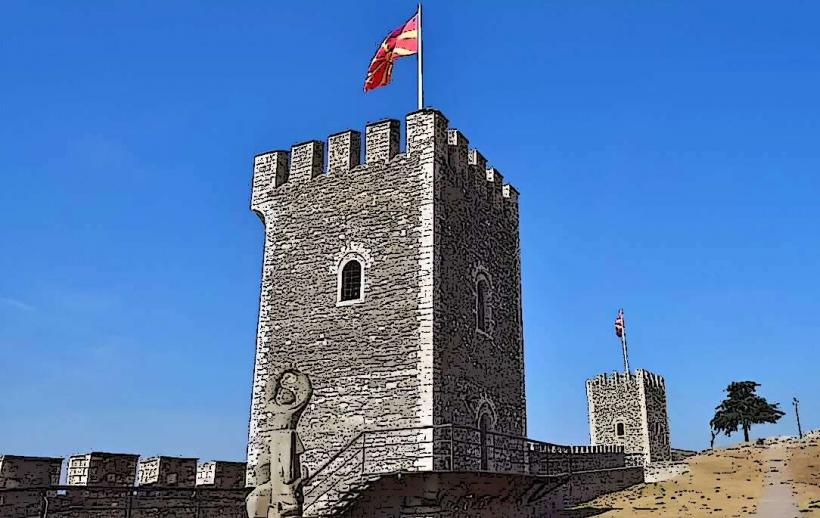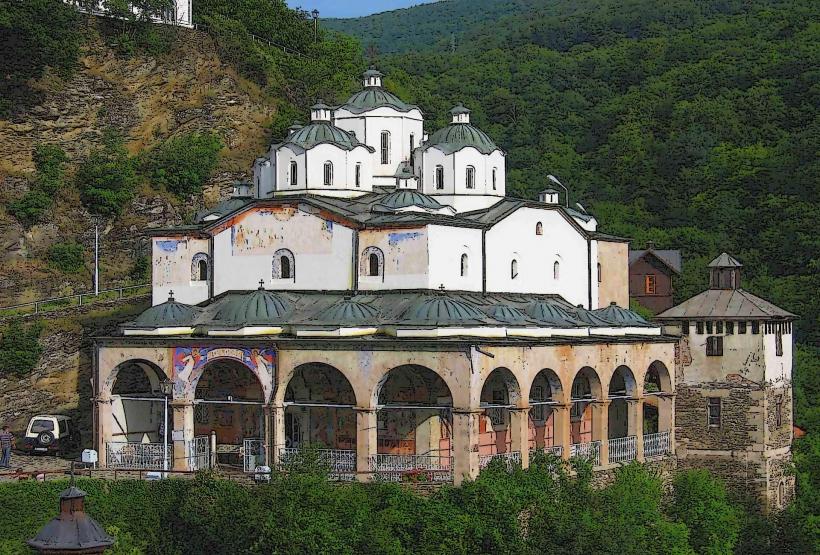Information
City: Kriva PalankaCountry: North Macedonia
Continent: Europe
Kriva Palanka is a city located in the northeastern part of North Macedonia, close to the border with Bulgaria. The city, situated in a valley surrounded by mountains, has a rich history and is known for its natural beauty, agricultural production, and role as a regional trade and transport center. Below is a detailed overview of Kriva Palanka, excluding specific landmarks:
Geography and Climate
Kriva Palanka is nestled in the Kriva Palanka Valley, which is bordered by the Osogovo Mountains to the south and the Balkan Mountains to the north. The Kriva river flows through the city, providing fertile land for agriculture.
Climate: The climate in Kriva Palanka is continental, with hot summers and cold, snowy winters. The city experiences a considerable amount of rainfall in spring and autumn, with average summer temperatures reaching 30°C (86°F), while winters can be harsh, with temperatures falling below freezing. Snowfall is common from December to February.
Topography: The city is located at an elevation of about 600 meters (1,968 feet) above sea level, with the surrounding mountains reaching over 1,500 meters (4,921 feet). This mountainous terrain provides picturesque views and creates a natural barrier between Kriva Palanka and the rest of the country.
History
Kriva Palanka has a long history, with evidence of settlement dating back to antiquity. The city's strategic location along important trade routes has shaped its historical development.
Ancient and Medieval Periods: The area around Kriva Palanka has been inhabited since ancient times. It was part of the Roman Empire, and archaeological findings suggest that it was an important settlement during both the Roman and Byzantine periods. In the medieval period, Kriva Palanka was an important center of trade and culture under the rule of various empires, including the Byzantine and Ottoman Empires.
Ottoman Era: During the Ottoman period, Kriva Palanka became part of the Skopje Pashalik (Ottoman administrative region) and developed as an important town in the region. The city prospered under Ottoman rule, with agricultural production and trade playing significant roles in its economy.
Modern History: After the fall of the Ottoman Empire, Kriva Palanka became part of the Kingdom of Yugoslavia. Following the independence of North Macedonia in 1991, the city continued to develop, particularly in agriculture, industry, and services. Today, Kriva Palanka serves as a regional hub in the northeastern part of the country.
Economy
Kriva Palanka’s economy is primarily based on agriculture, with some industrial activities and services. Its geographical location, fertile land, and proximity to Bulgaria and Serbia have shaped its economic profile.
Agriculture: The fertile valley around Kriva Palanka is ideal for the cultivation of grains, vegetables, and fruit. The region is known for its tobacco production, as well as the cultivation of potatoes, corn, and sunflower. Livestock farming, especially sheep and cattle farming, is also important for the local economy.
Industry: Kriva Palanka has a modest industrial base, including food processing, textiles, and construction materials. The region has seen some development in light manufacturing industries, though the city remains largely focused on agriculture and small-scale production.
Trade and Services: Due to its proximity to Bulgaria and Serbia, Kriva Palanka plays an important role in cross-border trade. The city also has a growing services sector, with businesses in retail, banking, and tourism becoming increasingly important.
Culture
Kriva Palanka has a rich cultural heritage, with influences from its Ottoman past and its role as a historical crossroads between different civilizations.
Folk Music and Dance: The city has a strong tradition of Macedonian folk music and dance, which is typical of many cities in North Macedonia. Folk music plays a vital role in the cultural life of Kriva Palanka, and traditional instruments such as the gajda (bagpipe), tambura (stringed instrument), and kaval (flute) are often used in local performances. Folk festivals and traditional dances are important cultural events in the city.
Art and Literature: Kriva Palanka has a growing artistic scene, with a focus on traditional crafts, woodworking, and pottery. The city also has a rich literary tradition, with local writers and poets contributing to Macedonian literature.
Festivals and Events: Kriva Palanka celebrates a number of traditional Macedonian holidays, such as Easter, Christmas, and Saint George’s Day (Đurđevdan), which are marked with celebrations, festivals, and local events. The city also hosts various cultural festivals that showcase its folk music, dance, and customs.
Education
Kriva Palanka offers educational opportunities from primary school through secondary education. The city also has a number of vocational programs to prepare students for careers in agriculture, industry, and other fields.
Primary and Secondary Education: Kriva Palanka has several primary and secondary schools, which offer general education, as well as specialized programs in agriculture, technology, and arts. Vocational education is an important part of the local education system, with many students learning practical skills that are directly applicable to the city's economy.
Higher Education: While Kriva Palanka does not have a university, it has access to higher education opportunities through institutions in Skopje and other nearby cities. There are also opportunities for technical training and vocational courses in fields like agriculture, mechanical engineering, and business.
Cultural and Educational Exchange: Kriva Palanka is involved in regional educational exchanges with Bulgaria and Serbia, allowing students and teachers to collaborate on projects and gain a broader understanding of the region’s shared history and cultural heritage.
Religion
The majority of Kriva Palanka's population is Eastern Orthodox Christian, with the Macedonian Orthodox Church being the dominant religious institution. There is also a small Muslim community in the city, primarily consisting of ethnic Albanians.
Orthodox Christianity: The Macedonian Orthodox Church plays an important role in the religious and cultural life of Kriva Palanka. Saint George’s Day (Đurđevdan) and other Orthodox Christian holidays are widely celebrated in the city. The local population frequently attends church services, and religious holidays are an important part of community life.
Islam: The Muslim population of Kriva Palanka is primarily of Albanian descent. There are several mosques in the city, and Islamic holidays such as Eid al-Fitr and Eid al-Adha are celebrated by the local Muslim community.
Religious Tolerance: Kriva Palanka is a multicultural and religiously tolerant city, where people of different faiths coexist peacefully. The city’s population includes both Christians and Muslims, and the two communities often participate in each other’s festivals and religious ceremonies.
Tourism and Recreation
While Kriva Palanka is not as well-known as other Macedonian cities for tourism, it has significant potential due to its natural beauty, cultural heritage, and proximity to the Balkan Mountains.
Natural Attractions: The surrounding mountains offer opportunities for outdoor activities such as hiking, birdwatching, fishing, and camping. The nearby Kriva Palanka River provides scenic views, and the region is rich in flora and fauna. The area’s natural beauty makes it an attractive destination for nature lovers and adventure tourists.
Cultural and Historical Tourism: Kriva Palanka has historical significance, particularly from the Ottoman era. The town’s traditional architecture, local markets, and cultural festivals make it an interesting destination for cultural tourism. The city’s history, as part of important trade routes between Bulgaria and North Macedonia, also adds to its cultural appeal.
Recreational Facilities: Kriva Palanka has a number of parks and recreational areas, where locals and visitors can enjoy outdoor activities and relaxation. The city also offers sports facilities and is known for its local sports teams and competitions.
Challenges and Future Outlook
Kriva Palanka faces several challenges as it continues to grow and modernize, particularly related to infrastructure, environmental sustainability, and economic development.
Economic Diversification: While Kriva Palanka’s economy is largely based on agriculture and small-scale industries, there is a need to diversify its economic base and attract investment in sectors such as tourism, information technology, and renewable energy.
Urbanization and Infrastructure: As Kriva Palanka grows, there is a need for improved infrastructure, particularly in transportation, education, and healthcare. Developing sustainable urban planning practices will be essential to ensuring the city’s long-term growth and quality of life for its residents.
Environmental Sustainability: With its focus on agriculture and small-scale industry, Kriva Palanka faces environmental challenges, particularly related to water management and waste disposal. Sustainable agricultural practices and better environmental management systems are needed to address these concerns.
Conclusion
Kriva Palanka is a city with a rich history, strong agricultural roots, and potential for future development. Its natural beauty, cultural traditions, and strategic location make it an important regional hub in northeastern North Macedonia. By addressing challenges related to infrastructure, economic diversification, and environmental sustainability, Kriva Palanka has the potential to grow into a more prominent and prosperous city in the region.



